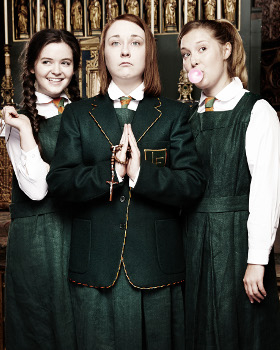Once A Catholic

© Simon Turtle
Mary J O’Malley’s 1977 play about convent school girls in Willesden, north London, is almost a local period piece in nearby Kilburn, but Kathy Burke‘s revival, while mercilessly heavy on the satire, doesn’t really unlock the inherent charm and lightness.
As Mary Mooney (Molly Logan) and her pals – they’re all called Mary, all three of them (there were seven in Mike Ockrent’s original, vastly superior Royal Court production) – are assailed by oppressive nuns and teachers, the life blood drains out of the girls, and the play.
The final act of rebellion involving a rude attachment on a crucifix looks more like a cheeky add-on (and a rather limp one at that) than surreal blasphemy, but that’s no fault of anyone; this was always a very simple, Irish sort of anti-religious play, not a heavy duty critical exercise in the style of Arrabal or Genet.
And I don’t think it’s been rendered redundant by a stream of acrid Irish reminiscences in the intervening decades, from Angela’s Ashes to the horrid film about the laundry girls and right up to the recent exposures of sexual abuse in Catholic education.
There’s still a perverse sort of nostalgia to cling on to, which is what makes the play so funny, even though Paul Wills‘s day-glo halo design, which explodes in stripy colours like a saint’s decorative headpiece, doesn’t make anything (or indeed explain) the portraits of Pope Pius XII and the iconic Irish tenor Josef Locke. These are the cultural touchstones in the pre-Ecumenical church and the London Irish sentimentality about the old country.
Big black Mother Peter (Cecilia Noble) takes the register and insists that the girls wear the stipulated Our Lady of Fatima baggy knickers. But Mary, whose parents are poorer than most, can’t afford to go on the pilgrimage let alone buy the underwear. She can’t do anything right: she is tricked into a flirtation with another Mary’s boyfriend and disrupts Father Mullarkey’s hilarious catechism class with an innocent enquiry about the sin of Sodom.
The casting and playing of the male characters is particularly strange. Sean Campion fulminates a furlong too far as Mullarkey, but at least he has the right sense of smug and hollow piety. Calum Callaghan twists the Teddy boy Derek into an excessive caricature while his sidekick Cuthbert (Oliver Coopersmith) seems to have wandered in from another play, and class system, entirely.
One of Mary’s sternest trials is a Gilbert and Sullivan singing lesson with the sinister music master Mr Emmanuelli, but there is not enough fat on the writing for Richard Bremmer to sustain the bug-eyed creepiness of his portrayal. The girls, too, seem unnecessarily ancient, ten years too old, at odds with their virginal vulnerability and sweetness in green pleated skirts and white ankle socks.










